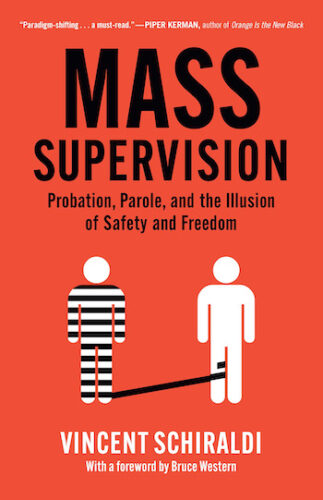Book Review: “Mass Supervision” — The Need for Alternatives
By Bill Littlefield
In this valuable book, Vincent Schiraldi firmly establishes that the people currently on parole or probation – as well as the community at large – would be better off and safer if both systems were to disappear.
Mass Supervision: Probation, Parole, and the Illusion of Safety and Freedom by Vincent Schiraldi. The New Press, 327 pages, $29.99.
 Vincent Schiraldi’s arguments against probation and parole are simple: the programs don’t work as intended, they are expensive, and they often ruin the lives of the people they are supposed to help and the lives of the members of their families.
Vincent Schiraldi’s arguments against probation and parole are simple: the programs don’t work as intended, they are expensive, and they often ruin the lives of the people they are supposed to help and the lives of the members of their families.
Schiraldi’s experience in the field of criminal justice includes stints as the Director of Juvenile Corrections in Washington, D.C. and Commissioner of the New York City Department of Correction. Though he’s also been a research fellow at Harvard’s Kennedy School, it’s his practical experience with probation and parole departments and the people allegedly being served by those departments that make his arguments convincing.
Parole and probation have been around for as long as various cultures have been incarcerating some of their citizens. The idea has always been that both parole and probation give offenders an opportunity to rehabilitate themselves outside of the obvious restrictions imposed by prison or jail. But as Schiraldi points out, the conditions imposed on men and women on parole or probation are often so impossibly harsh that they all but guarantee the alleged beneficiaries of the programs will be incarcerated again, frequently without committing a crime, and often for more time than they would have served if parole or probation hadn’t been in the equation. “Violations” such as a traffic ticket or participation in an argument loud enough to cause somebody to call a police officer can lead to the re-arrest of somebody on parole or probation and then a prison term wildly inappropriate to the offense he or she is alleged to have committed. Beyond that, if you are on parole or probation, “police could come into your house whenever they wanted — no warrant, no probable cause — and the refusal to let them do so could result in your incarceration.” People on parole or probation are stripped of all sorts of rights citizens normally take for granted.
Schiraldi also points out that cities and states have often used the parole and probation systems to pad their budgets in hard times. Citizens on parole or probation have to pay for such “services” as electronic monitors, drug and alcohol tests, and court fees. The fees are arbitrary and often ruinous. Sometimes frequent drug tests are required of people who have no history of drug misuse, since each test kicks some money back to the state agency or private company running the parole or probation system. Schiraldi found that in some cases, the collection of fees from those allegedly benefiting from parole or probation keeps the city budget in the black, pays bonuses to the parole officers, and augments the salaries of bureaucrats at the top of the operation, and “that using arrests and court processes to generate revenue for the city” is sometimes flagrant enough to be termed “a judicially sanctioned extortion racket.” People on probation or parole can be “revoked” and sent to prison for not having the money to cover their fees, meaning that the system often functions like a 21st century debtors’ prison. Obviously it is difficult for formerly incarcerated people to rebuild their lives under these circumstances: “The culture of supervision — in which success is limited and human needs are further criminalized or ignored – forces people who are under supervision constantly to fear incarceration.”
It’s perhaps not surprising that some of the people Schraldi references in Mass Supervision have chosen to remain in or return to prison rather than submit to the uncertainties, built-in pitfalls, and humiliations of parole or probation.

Author Vincent Schiraldi founded the Center on Juvenile and Criminal Justice and the Justice Policy Institute.
Mass Supervision suggests that at least in terms of the number of people victimized by the conditions of parole and probation, the situation is currently a little better than it has been in the recent past. Several states have cut back on the programs, replacing them at least partially with diversion programs or more effective and humane sentences, and providing community programs that help the formerly incarcerated find housing, work, and various necessary services without holding over their heads the threat of re-arrest. But an alarming number of people throughout the country are still serving prison sentences for parole violations, rather than for committing crimes, and, as is the case in prisons and jails in general, a wildly disproportionate number of those people are non-white and poor. This is one argument for Schiraldi’s “net-widening theory of community supervision — that probation and parole widen the net of social control rather than serve as true alternatives to incarceration.”
The final chapters of Mass Supervision provide alternatives to the current systems of parole and probation. Schiraldi points out that those alternatives, including community-based service centers, policies focused on recovery rather than punishment, and people who regard previously incarcerated men and women as fellow human beings, rather than as “ex-cons” likely to commit more crime, have worked in the areas where they’ve been instituted. Mass Supervision is heavy with statistics that demonstrate that while probation and parole do not decrease crime or increase public safety, the alternative programs most certainly do achieve these ends. Though Schiraldi acknowledges that more research is necessary, he firmly establishes that the people currently on parole or probation – as well as the community at large — would be better off and safer if both systems were to disappear.
Bill Littlefield works with the Emerson Prison Initiative. His most recent book is Mercy (Black Rose Writing, 2022)

Thanks for this, Bill. Extremely enlightening!
There’s a motto and acronym in the corrections community, the three C’s (care, custody and control). Mr. Schiraldi deserves his own three C’s (calm, cool and collective).